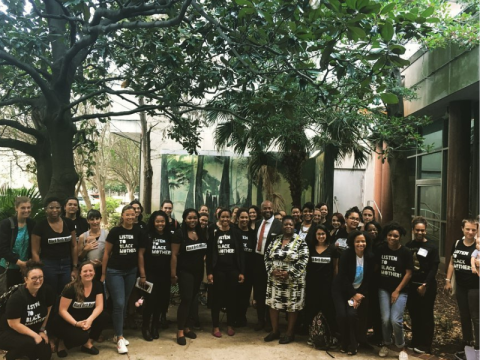Tulane University scholars participate in study to inspire growth within the New Orleans Maternal Child Health Coalition
A team of 11 scholars across a variety of disciplines and organizations recently released a study identifying areas of growth, success, and challenge within the New Orleans Maternal Child Health Coalition. The study, published in the Maternal and Child Health Journal, seeks to amplify MCH community-driven work and serves as a guide for similar groups seeking to mobilize.
According to the study, the United States faces one of the highest maternal mortality rates in the world, with Black families facing these tragedies at rates three to four times higher than non-Hispanic white families. Longstanding histories of structural racism in Louisiana intensify these trends to increasingly fatal levels.
Since 2018, the MCH Coalition has served local New Orleans communities as a grassroots organization comprised of healthcare providers, non-profit organizations, advocates, and academics whose collective goal is to support and protect the health of local birthing families.
Melissa Evans, Ph.D., a co-author of the study and an assistant professor at the Celia Scott Weatherhead School of Public Health and Tropical Medicine said that coalitions like MCH can advance health equity in communities by empowering the community itself.
“It is important to share our experiences and best practices with an academic audience who may be interested in creating a similar coalition to support their own health equity work,” Evans said. “[But] writing this paper alongside our non-academic coalition members demonstrates the mutual respect and collective strength of our coalition.”
Researchers who spearheaded the study, “Building Collective Power to Advance Maternal and Child Health Equity: Lessons from the New Orleans Maternal and Child Health Coalition” intentionally collaborated with scholars and advocates from various backgrounds to gain broader perspectives and produce a well-rounded body of work.
“I think it's fairly unique that we used a model that was co-led by people inside and outside of educational institutions,” Clare Daniel, Ph.D., director of research at the Newcomb Institute and primary administrator of the MCH Coalition said.
The early stages of developing the study began in January 2021 as researchers started to conceive ideas, establish plans, and create a list of interviewees for the study.
“It made sense to us that we should try and evaluate this thing that we've all been participating in and see if we can improve it,” Daniel said.
Scholars conducted anonymous interviews with 12 key informants from within and outside MCH in September 2023. Each informant selected identified as female and worked in the nonprofit sector, as a birth worker, in academic fields, or in governmental institutions.
Every interview was transcribed word-for-word, and data was analyzed by two researchers using inductive and deductive coding across 28 key categories.
Iman Johnson, a researcher for the study and a doctoral candidate at the School of Public Health and Tropical Medicine, said that scheduling interviews for the study was especially challenging after Hurricane Ida hit coastal Louisiana in August 2021.
“Everyone we interviewed was so generous with their time and what they shared. Particularly when I was a new doctoral student, I was appreciative of them taking the time to do that, even under those difficult circumstances that we were all experiencing,” Johnson said.
One of the many disparities that the study highlights is the disproportionate health risks that Black birthing communities face. The study asserts that Black pregnant people in New Orleans are two to three times more likely to face serious health complications during labor such as preterm birth, low birth weight, and infant mortality.
“What I've come to know since writing this paper is that none of this happens in a vacuum. We have the social determinants of health that largely impact maternal health outcomes, so we need more than just healthcare providers. We need more than just public health folks at the table. It's going to take a coalition of folks literally to advance health equity,” Johnson said.
Many informants who participated in the study described the most salient challenges of advancing the mission of MCH as broadly systemic, while others highlighted redundancies, internal structures, and underrepresentation.
“This was a way to gauge how the people involved in the coalition and the people adjacent to it perceive the coalition and its work, and how we can utilize their perspectives to improve what we're doing,” Daniel said.
To read the study and learn more about the findings, visit link.springer.com/article.

